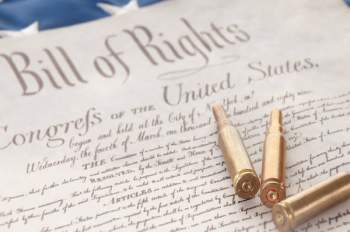
What You Should Know About Purchasing Guns

Purchasing Guns Background
The act of purchasing firearms has long been a controversial issue in America. With two sides present (those who want more gun rights, and those who want more restrictions) America has taken a stance to regulate the purchases of handguns and machine guns on a federal level, while widely adopting a casual stance towards the purchase of hunting firearms.
Retail gun dealers are regulated under federal law, and cannot sell a firearm to any prospective buyer who can potentially pose a threat to society. Machine guns have widely been banned through the National Firearms Act of 1934 and require a special permit authorized only by the US Treasury Department.
Complexities arise in handgun laws because they are narrowly regulated on a local level. Each state has its own unique interpretation of handgun laws, which are enforced at all gun shops. The Brady Bill which was passed in 1994, is a Federal law that requires a background check and waiting period for all purchases of handguns. Laws pertaining to the purchase of firearms has been difficult to enforce due to an assortment of loopholes present in private transactions and the secondary markets.
Specific Laws
Specific laws regarding the purchase of firearms must be split into two groups-Federal laws and State laws. Federal regulations revolve around a prospective buyers disposition and whether or not he "poses a threat to society." Common impediments for the purchase of a firearm are-convicted felon, fugitive, mental illness, or addiction to a stimulant.
In addition, Federal law states that no individual can purchase a handgun under the age of 21 or a rifle under the age of 18. Federal regulation is also present for distributors and sellers of firearms. All gun dealers must possess a FFL (federal firearms license) in order to sell firearms to individuals from outside states. The complexity and descriptive nature of gun laws is found at the local level. Each state possesses its own unique constitution which enforces its particular gun laws.
Because America has a lenient stance on gun laws when compared to other developed nations, the median interpretation for a states gun laws is as follows-no permit is required to purchase, a license of ownership is not necessary, nor is registration, however a permit is required to conceal a loaded handgun. A casual stance indeed, however, there are many states that do have a strict attitude towards guns and indeed require permits for purchase and a license for ownership. Examples of states with stringent gun control-New Jersey, New York, Massachusetts, and California.
State Variations
Each state has its own unique interpretation and enforcement method in regards to gun laws. Based on the Brady Scorecard (a scoring system to judge the strength of a state's gun laws) more stringent gun control laws will be found in the Northeast, and West Coast, while regions such as the deep South, Midwest, and great plains will have possess a more casual stance.
Generally speaking, an individual will experience less red tape and fewer restrictions when purchasing a firearm in a conservative state as oppose to a liberal one. This statement can be somewhat justified when looking at which states require permits for purchase.
Connecticut, Hawaii, Illinois, Iowa, Maryland, Massachusetts, Michigan, Minnesota, Missouri, New Jersey, New York, and North Carolina. Complexities arise in state laws because of constant variation and a series of contradictory practices present in particular state's constitutions. For instance, law enforcement in Arizona will recognize a permit to carry from Nevada, but Nevada won't recognize a permit to carry from Arizona. Understanding your particular state's gun laws is necessary to avoid a serious conflict.
Purchasing Gun Parts
Like the laws regulating the purchasing of firearms, the obtainment of gun parts must follow a federal and local legal code. The accessory most rigidly governed by federal law is ammunition. The most basic restriction is that convicted felons, habitual drug or alcohol users, illegal aliens, or individuals subject to domestic violence are not permitted to purchase or transfer ammunition of any kind.
Federal law also restrict the sale of long gun ammunition to anyone under the age of 18, and handgun ammunition to anyone under the age of 21. Accessories and gun parts are also regulated under local law, and subject to variation based on state. Only two states (Illinois and Massachusetts) require a permit to purchase ammunition, however, many states do impose a restriction on armor piercing ammunition, purchases made in bulk, and magazine size.
Gun Parts, such as silencers, assault rifle additions, scopes, and laser guides are all placed under the umbrella of Federal law, and require specific licensing. Although similar to the structure of gun laws, gun parts and accessories are more closely governed by the federal government.
Online Purchasing
Like most purchases made online, a gun transaction over the internet awards a buyer with numerous intangible benefits. A consumer is given more options in terms of selection, and purchasing techniques.
The price of guns purchased online is significantly lower as a consumer will be given the opportunity to compete in auctions or to purchase used guns. Although a frightening prospect, gun purchases made online are regulated by federal law and are considered secure and legitimate. In order for a firearm to be purchased over the internet the following process must be met-all guns purchased online must be shipped only to a holder of a Federal Firearms License.
The firearm is not shipped to the consumers house, but instead, to the closest licensed gun dealer in the buyer's area. Once the gun is shipped, the consumer must present and fulfill his local state's requirements in regards to permits or licenses for the purchase to be finalized.
NEXT: Your Guide to Gun Trade





















